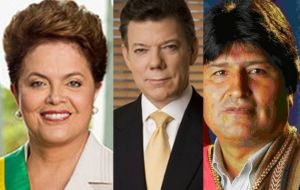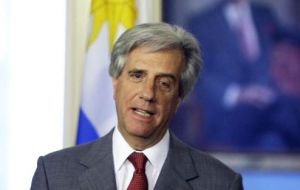MercoPress. South Atlantic News Agency
Ballot test this year in Latam: Brazil, Colombia, Bolivia, Uruguay, Panama, Costa Rica and El Salvador
 Dilma, Santos, Morales, running for re-election
Dilma, Santos, Morales, running for re-election Seven out of 19 Latin-American countries will be holding elections this year and in four of them, Brazil, Bolivia, El Salvador and Uruguay, left leaning catch-all coalitions will try to hold on to power. Likewise with two conservative governments, Colombia and Panama.
In Brazil the country with the largest economy in Latin America and with most political clout, the Workers party will attempt the re-election of president Dilma Rousseff. In Bolivia, Evo Morales and his Movement to Socialims, MAS, are after a third consecutive mandate; in Uruguay the catch-all Broad Front coalition will try to retain power with former president Tabare Vazquez (2005/2010) and in El Salvador, the Farabundo Marti National Liberation Front is campaigning for Salvador Sanchez Seren, a former guerrilla and currently Vice-president.
A left wing coalition is also trying to take office in Costa Rica, where candidate Jose Maria Villalta is in a tight competition with Johnny Araya from the incumbent centre National Liberation Party, currently in office with a much discredited president Laura Chinchilla.
In the two countries with conservative governments, Colombia, president Juan Manuel Santos is running for re-election and in Panama, the incumbent Democratic Change party with candidate Jose Domingo Arias, wants to replace Ricardo Martinelli, who is barred from a consecutive period.
Following Socialist Michelle Bachelet victory in Chile, who takes office next March, several left wing governments, from moderate to radical, will be ruling ten Latin-American countries. Another four have centre governments and in five the conservatives (right wing).
The election round in Central America begins 2 February with presidential elections in Costa Rica and El Salvador. In Costa Rica, the most prosperous of the region, the economy is not working and thus a left wing coalition, social-democrat version, is hoping to take office for the first time.
In El Salvador moderate left winger Mauricio Funes was elected president in 2009, and has managed some social advances but a slow economy is conspiring. The former guerrillas are desperately trying to retain office from Norman Quijado, belonging to the conservative Arena, which ruled the country from 1989 to 2009.
On 4 May elections will be held in Panama with the ruling conservatives of President Martinelli fighting to stay in office but challenged by a centre-right alliance and its candidate Juan Carlos Varela. The Socialist candidate Juan Carlos Navarro is a distant third according to opinion polls.
The Colombia ballot is on 25 May with Santos and his peace negotiations with the FARC guerrillas, which he has promised to submit to a referendum, fighting for re-election. He is challenged by a new party founded by Alvaro Uribe, a former president (2002/2010) and mentor of Santos and who has chosen as presidential candidate Oscar Zuluaga. Uribe-Zuluaga question that Santos has gone 'soft' in his promises to the guerrillas and they refuse to accept amnesty for those involved in killings or political privileges so that former guerrillas can be elected to Congress. Colombia's legislative elections will be held on 16 March.
Brazil's turn comes on 5 October, after it hosts the World Cup. Depending on how successful Brazil is in the field and with the economy, voters might forget the massive protests of last June/July against corruption and waste, and re-elect Dilma Rousseff, thus ensuring 16 years of uninterrupted Workers Party in the presidential office.
However if Dilma does not manage 50% of the ballot on the first round there will be a run-off a month later. She faces interesting challenges from Aécio Neves and governor Eduardo Campos that have strong political machines to support them.
Bolivia also votes in October and although the 2009 constitution bans three consecutive re-elections the Constitutional Tribunal in 2013 ruled in favor of a new period for president Morales, arguing that he did not complete his first mandate (2006/2010) and there was a 're-foundation' of the nation as a 'pluri-national' state. His two main challengers are conservative Ruben Costa and a former ally of Morales, Juan del Granado who leads, “Movement with no Fear”.
In Uruguay outgoing Jose 'Pepe' Mujica and the Broad Front are working for the election of Tabare Vazquez next October. Public opinion polls are very encouraging but recent political incidents, a long year ahead, and external impacts such as a rise in US interest rates or a fall in commodity prices, if they pinch pockets could make voters think twice.





Top Comments
Disclaimer & comment rules-

-

-

Read all commentsAnother chance ?
Jan 06th, 2014 - 08:18 am 0No, no, it must be a set period of four years maximum for all higher offices.
This allows the next person to take office and steal everything he can too.
Be fair please to the others waiting in line.
Tell me is it a prerequisite to be a former guerrilla to be in politics in SA? No, but it helps I hear you say.
Jan 06th, 2014 - 11:42 am 0High time they had a damn good clear out, although in most cases the replacements are as crazy as the predecessor, just look at Venezuela.
Jan 06th, 2014 - 01:17 pm 0Commenting for this story is now closed.
If you have a Facebook account, become a fan and comment on our Facebook Page!